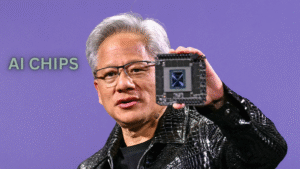U.S. Blocks NVIDIA, AMD AI Chip Sales to China
New restrictions placed on the sale of top-tier AI chips to China for security reasons.
NVIDIA and AMD formulate plans for new compliant chips.
NVIDIA’s B20 and AMD’s Radeon AI PRO R9700 chips targeted for China.
Projected losses by NVIDIA amount to $4.5 billion, with expectations of $8 billion more in damages.
What Are AI Chips?
AI chips are designed to augment the cognitive capabilities of hardware. These aid in the functioning of autonomous vehicles and virtual assistants. China has ambitions to produce its own AI technologies and needs these chips, but the U.S. has restrictions placed on certain chips.

Why New Rules?
The United States fears China may leverage the advanced technology for military or espionage activities. As a result, there is a policy in place that bans selling high end chips to China without a license and more recently, these policies have been expanded and even new modifications were added to compliant chips.
NVIDIA’s Challenges
As one of the leading chipmakers, NVIDIA created a compliant chip, H20, designed for the Chinese market. Now, their policy of having no license required for compliant parts creates a licensing nightmare and quite some financial troubles. NVIDIA’s losses amount to $4.5 billion due to their inability to trade H20 chips. They also faced $2.5 billion in suspended shipments and anticipate further losses that would exceed $8 billion.
NVIDIA’s New Plan
NVIDIA is developing new chips for the Chinese market. One is B20 which is designed to be a simpler chip tackling AI workloads. The other one is more expensive than H20 as it uses their latest Blackwell tech, flagship chip, costing $6,500-$8,000. These may be ready by July.
AMD’s Situation
AMD, a competitor in the two emerging AI developed economies, cannot sell his MI250 AI chip to China until he receives a specific license. His previous generation MI100 chip may still pass. During an earnings call, AMD mentioned that the restrictions are unlikely to have a big impact.
What’s Next?
AI race; US fear spy and economy threats from China. China ramps up its own chip making with companies such as Huawei, while the US tries to stifle competition with limited sales. The global impact of this competitive rivalry is more innovation and growth of technology.
With violations of sales restrictions for more advanced AI chips set in place, NVIDIA and AMD are AMD responding by creating less powerful and advanced versions to service chinese markets.
Understanding AI Chips
An AI chip is a component of a computer system designed to allow machines to smartly learn and make decisions. They are important for self-driving cars, virtual assistants, and advanced data processing. China seeks to harness these chips for AI development, which can help in healthcare, education, and even national defense.
U.S. Restrictions Explained
The U.S. government fears that China could exploit more advanced AI chips for military applications or surveillance. In response, U.S. policy mandates that companies sell these high-powered chips to China only with a special license. These policies were initiated a few years back but became more stringent in 2025. Now even NVIDIA’s H20, which was designed to comply with earlier restrictions, requires a license which complicates doing business in China.

NVIDIA’s Financial Hit
NVIDIA, one of the most prominently recognized names in AI chip technology, has had to incur a considerable amount of losses because of these rules. Their h20 chip was made solely for china to adhere to older export restrictions. However, the new rules have completely halted its sales sans a license, which translates to a loss of 4.5 billion dollars in early 2025. The company also was unable to ship 2.5 billion dollars worth of h20 chips, and predicts that in the new future, there will be an additional 8 billion dollars worth of revenue losses according to The New York Times.
NVIDIA’s Response Strategy
To address these issues, NVIDIA is creating new chips that comply with US standards. One of them is B20, a low complexity AI chip oriented towards Chinese markets. Another one is the budget chip derived from NVIDIA’s latest Blackwell architecture; the B20 chip is priced 6500 to 8000 dollars, significantly cheaper than h20’s 10 to 12 thousand dollars. According to Reuters these chips might be ready as soon as July 2025.
AMD’s Position
Another unfortunate victim is chipmaker AMD. With the requirement of a new MI250 AI chip, their dox will still be allowed to sell the older MI100 chip. AMD doesn’t think that the restrictions will have a big effect on their business according to reuters.
Broader Implications
Theestablished policies from the United States show its interest towards AI supremacy. According to Foreign Policy, the U.S. is trying to keep its edge in technology by cutting off China’s access to sophisticated chips. On the other hand, China is investing in some of its own chipmakers like Huawei, which would reduce dependency on U.S. technology. This geopolitical equation raises the dilemma of whether the restrictions from the U.S. would slow down China’s AI advancement or accelerate their race to innovate.
Looking Ahead
AMD and NVIDIA’s shift to produce these new chips marks the onset of the next chapter in the U.S.-China technological rivalry. With AI chips at the center of focus the competition is exponential. Claiming the number one spot in AI technologies will greatly shift the world technology order. There is a lot on the line for both nations as the stakes increase and execution of the plan becomes more intricate.
Based on the latest information, things can change drastically contemplation for the outcome of these technological clashes is boundless.
These sudden developments show the major role that AI holds at the present time and the ideal intertwining of commercialization and national defense strategy.
Internal Links
Learn more about the OpenThinker vs DeepSeek AI showdown in our in-depth analysis: OpenThinker vs DeepSeek: Future or Flop?
Discover how DeepSeek AI’s bold strategy might reshape the AI landscape by 2025: DeepSeek AI: Will Its Risky Bet Disrupt AI by 2025?
Explore why many believe dropshipping is dead without AI — and how smart sellers are adapting: Dropshipping Is Dead Unless You Use AI – Here’s Why
External Links:



















Post Comment